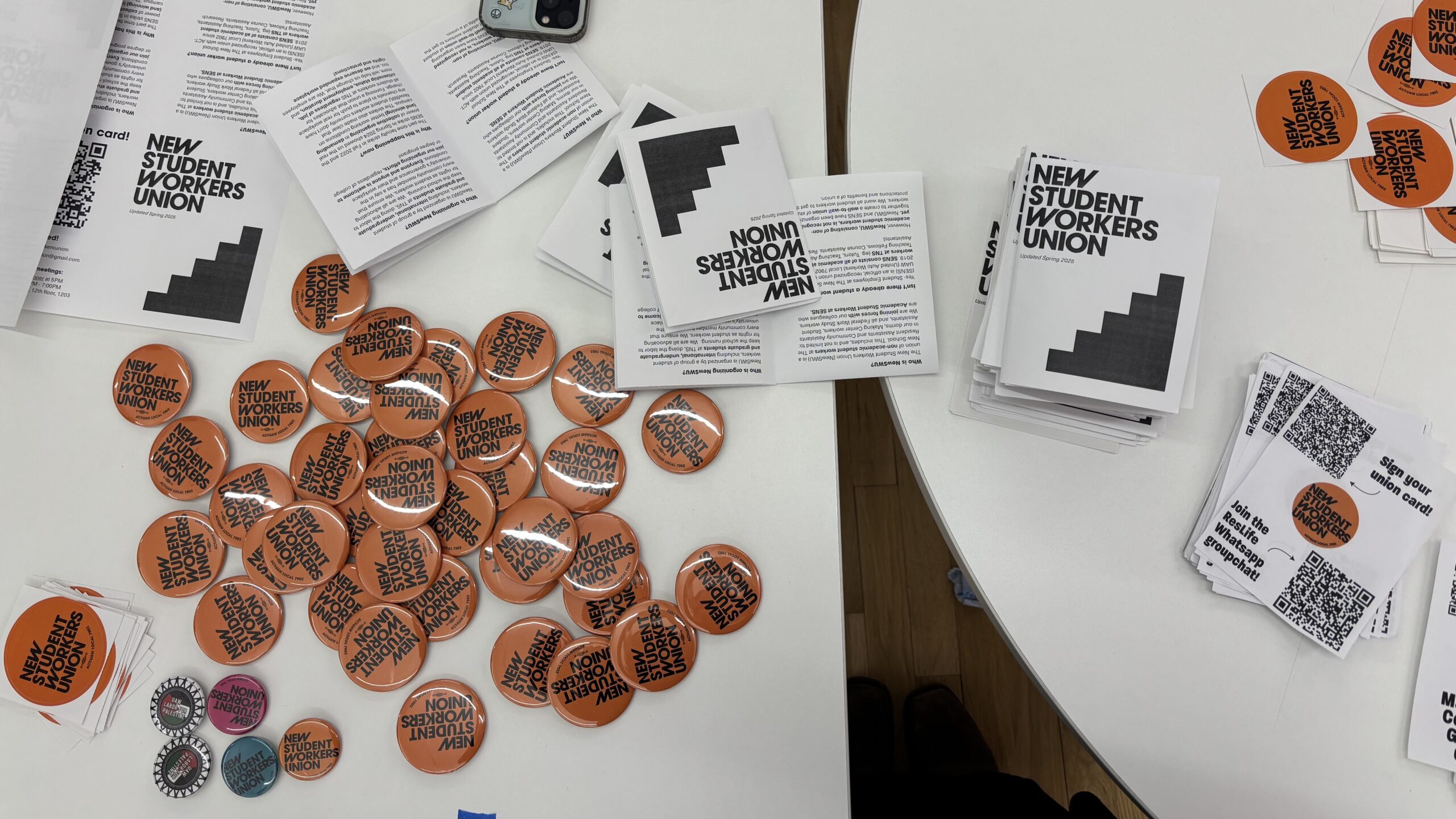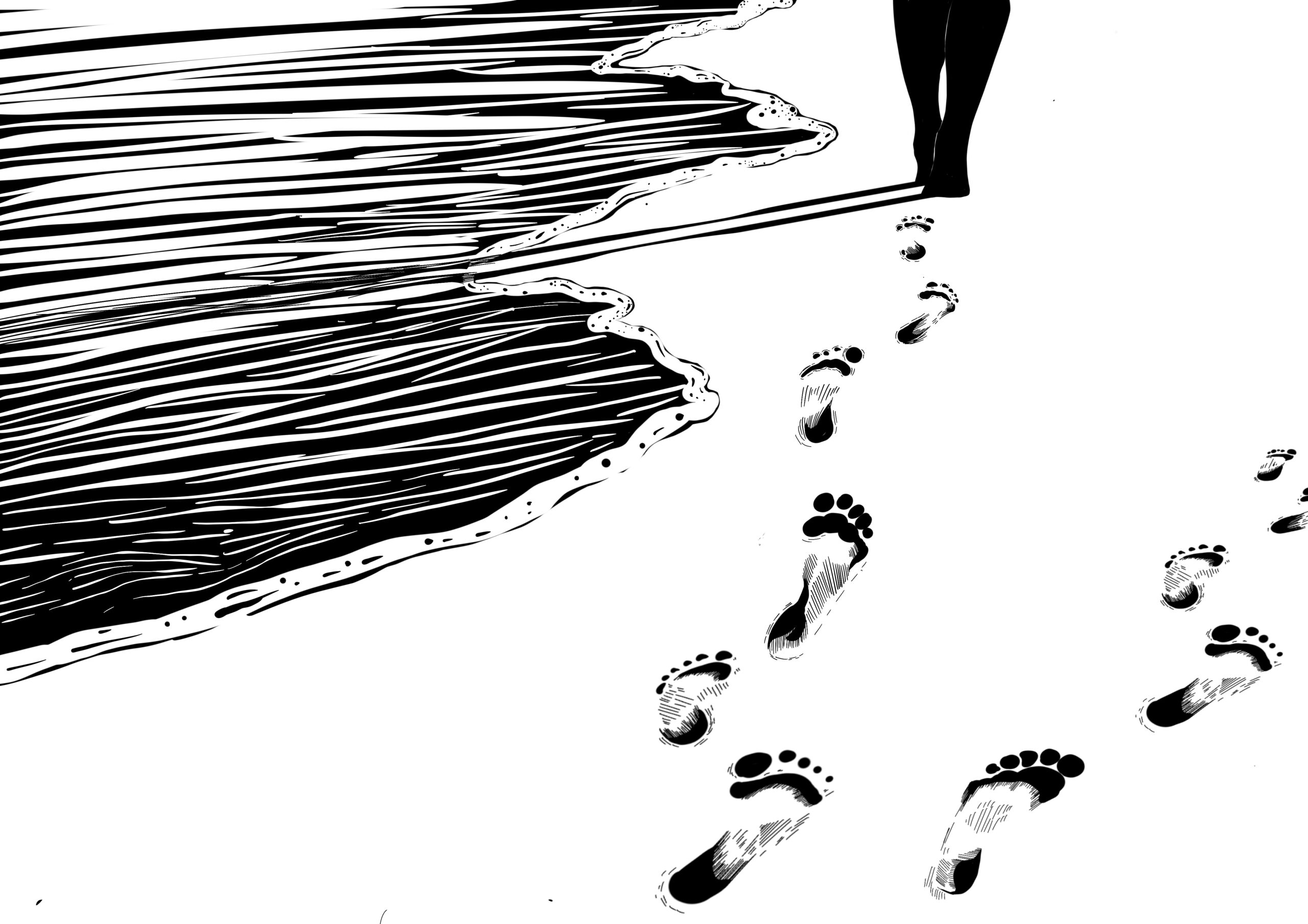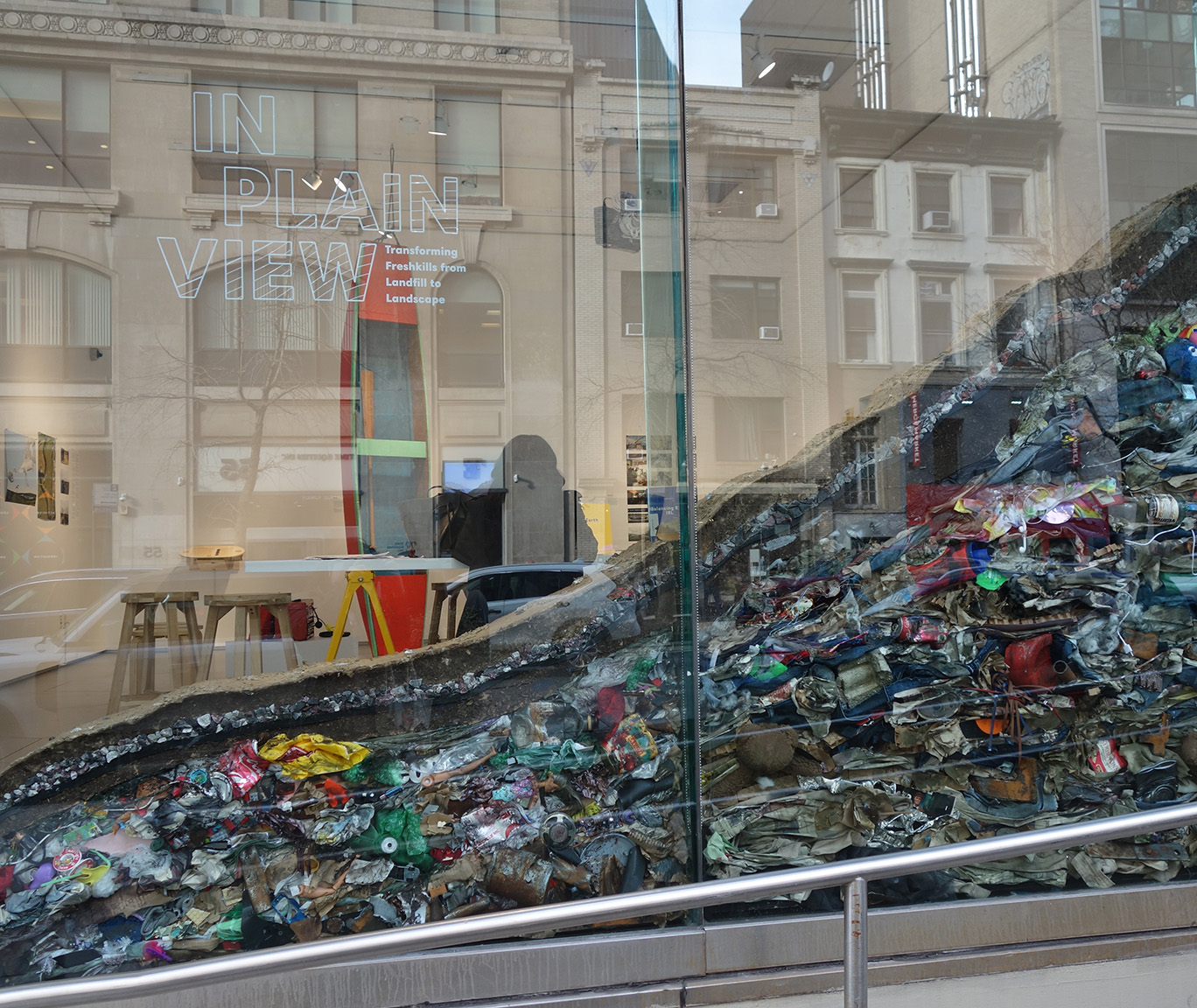On the main shopping strip of Underhill Avenue in Prospect Heights, Brooklyn, sits the Figure 8 Recording Studio. From the outside, it appears to be nothing more than a residential building. But on the inside, two recording studios are bookended by a red front door where guests must leave their shoes, a bright kitchen filled with hanging plants, and a large grassy backyard with a picnic table. The walls of the recording spaces are layered with sound-absorbing wooden blocks, while vintage Falcon amplifiers, stacked speakers, tarnished guitar pedals, and miscellaneous microphones line the corners of each room.
It’s in this eclectic studio that jazz vocalist, multi-instrumentalist, and composer, Amanda Ekery is recording her latest record: “Árabe,” a jazz, folk, pop-infused album that serves as a tribute to Ekery’s Syrian-Mexican roots and hometown of El Paso, Texas.
After finishing up a lunch break in the backyard, Ekery and her band head back inside to put their leftover Thai food in the fridge. She is accompanied by her producer Bobby Lane and sound engineer Jennifer Nulsen, as well as percussionist Jess Tsang, guitarist Jholey Garay, pianist Andrew Boudreau, bassist Hannah Marks, and mandolinist Emily Johnson-Erday. The group grabs some coffee and casually makes their way into the recording space as Ekery and Lane discuss the recording lineup for the album’s next four songs.
They decide to begin with “Sky Rooted,” a song that Ekery wrote about her family’s migration to El Paso. As the group starts recording, Ekery’s soulful voice comes in, blending beautifully with the tones of the instruments accompanying her.
Her sound is crisp and clear, drifting seamlessly through the studio like a breeze as she sings lines like, “Names are forgotten / But faces hold trace / Traces of memories / Stories to unlace / Rooted we are / Through their motives and eyes / We carry them on / Always rooted to the sky.” Through these lyrics, she tells the story of her family’s movement throughout the Northern Hemisphere. While Ekery’s heritage is rooted in Mexican lineage on her mother’s side and Syrian lineage on her father’s side, her elders from both lineages migrated throughout the United States and Mexico before settling down in El Paso.
Though this was the path for Ekery’s elders, it has also been one that many in the El Paso community have traveled. During the 1870s to 1930s, almost 300,000 immigrants from “Greater Syria” traveled to the Americas, with 1,600 people ending up in Texas. Some Syrian influence in El Paso has also developed from the community’s strong cultural presence in nearby Mexican cities, such as Veracruz, Puebla, and Mexico City. Through “Árabe,” Ekery details her six-year experience researching migration trends along the Texas border, enabling her to learn more about her hometown community and family lineage.
Music runs throughout Ekery’s family, as band played a significant role in her musical beginnings. When she was five, her mother put both her and her brother into piano lessons. After her brother began playing trumpet, she started playing the flute, which she continued throughout high school. “The band director there, his name is Kenny Capshaw,” Ekery shared. “He was also my dad’s band director. I know, small El Paso town.” Alongside her high school band, Ekery also went on to play piano for a jazz band and city-wide jazz ensemble.
When it came time for college, Ekery initially hesitated about what she would pursue. “I didn’t want to go to college,” she said. “I applied to one school, the University of North Texas for music ed, for piano. And I got in.” After studying this for one semester, she transferred into the university’s Jazz Studies program, one of the most distinguished degrees of its kind in the nation. There, she majored in voice performance and began taking classes in composition and arrangement. After graduating, Ekery left Texas to receive her master’s degree in Jazz Performance from the New England Conservatory in Boston. This marked the start of her life in the Northeast, as she moved to New York City in 2018 to pursue her professional music career.
That same year Ekery released, “Keys With No Purpose,” an album about sexism in jazz culture, which she began composing in Boston after a wave of sexual assault cases at Berklee College of Music. The record was also informed by the research she began co-conducting during this time, which studied the alternative methods being developed to teach jazz to women and increase their accessibility in the genre. For example, Ekery found that it’s effective when education initiatives are inclusive of the instruments that female players have access to and avoid grouping players by “better” and “worse” rankings.
While this research will be published in “The Routledge Companion to Women and Music Leadership” book, Ekery has also applied these findings to her own initiatives. This includes her work as Assistant Director of Academic Affairs and a professor at The New School’s College of Performing Arts, as well as Founder and Director of El Paso Jazz Girls, a summer camp that teaches jazz to K-12 female musicians in El Paso. The program is currently in its seventh year and even earned Ekery the 2022 Jazz Hero Award from the Jazz Journalists Association.
Similar to her role in the El Paso Jazz Girls program, “Árabe” has given Ekery a way to connect her work back to her hometown and reflect another part of her identity. Though the album focuses primarily on Ekery’s culture, gender equity has still played a large role in its production. After all, the musician was awarded The NYC Women’s Fund for Media, Music, and Theatre grant to record the album, and the majority of her studio band is made up of women.
Ekery began working on “Árabe” by researching her own family’s immigration records. She then met with Dr. Mark Eggerman, a Research Scientist at Yale University, who had done previous anthropological work on the United States-Mexico border. Through their meeting, Ekery formulated her research questions and learned how to approach people as research subjects ethically.
Soon after, she headed down to El Paso to begin her fieldwork by recording interviews with family, friends, and everyone in between. One of Ekery’s oldest friends has a familial connection to the president of the Syrian Ladies Club of El Paso, and subsequently, ten of the club’s members participated in Ekery’s first interview. Additionally, she worked with local library records to learn more about the city’s history. To Ekery, the process was not necessarily about finding an exact answer to Mexican and Syrian migration, but rather seeing what developed throughout her research.
“I found a ton of information and met a bunch of cool people who I ended up interviewing,” Ekery said. “I wrote songs that vary from evil eye culture that’s shared in both Mexican and Arabic communities, to immigrant entrepreneurship and biracial identity. Each song has a story to it.”
“Lucky,” for instance, is a playful take on her family’s love for gambling. While the song itself is an ode to the Syrian practice behind it, Ekery found it also holds a connection to Mexican culture. “In El Paso during the Mexican Revolution, it was illegal to gamble, but El Paso was like, ‘We’re gonna let it happen and just fine it,’” Ekery explained. “So, it’s interesting how all these things came together just by reading people’s stuff.”
While she began to write songs in El Paso and New York City, it wasn’t until her Artist-in-Residence at the Arab American National Museum in Dearborn, Michigan a year later that Ekery felt she had the space to fully translate these themes into music. She wrote a total of 12 songs, composing the vocal parts for herself and writing piano, guitar, bass, percussion, and mandolin accompaniments for her studio band.
Ekery is also in the process of finalizing essays for each song, which will appear as extended liner notes on the final album cover. In each piece, she tells the story about the El Paso she knew — and the El Paso she has come to know through the album. While she writes about her childhood memories and family history, she discusses the origins of El Paso, Mexico, and Syria and the cross-cultural connections these places share. With this, Ekery also reflects on American xenophobia and the politicization of a Texas border town like El Paso. She accompanies her thoughts with clips of lyrics, quotes from interviews, and Arabic and Spanish vocabulary.
Ekery has a strong artistic vision for her music. Yet, when recording with five other musicians, it’s important to have room for collaboration and change. “Sometimes, I’ll write very specific things for people to play, but how you play it within this measure is your choice,” she explained.
This mindset transcended into the recording session, as the group made suggestions and reworked sections over different takes. In “To Give,” a song about Mexican and Syrian food mannerisms, the band experimented with the song’s “feel” by having different musicians play with a metronome. After the first take, Nulsen asked Tsang, Boudreau, and Marks to turn their “clicks” on. As the metronome ticks played in their headphones, the second take had a slightly more confined and “tighter” rhythm than the previous one.
“It’s her heritage and sort of musical language,” said Nulsen. “It’s something that I wouldn’t normally get to work on. A lot of times, you end up with just a straight jazz album or a straight pop or folk album, and she kind of has all three of those influences working together in a way that feels very authentic. It’s got this really nice, sort of prismatic look across a bunch of really hot-button topics, like politics, religion, belonging, and family, all from her perspective.”
In her song “Between,” Ekery sings over a mid-tempo piano beat as she reflects on the experience of migrating to America. In one verse, she sings, “How long after one migrates / Works to assimilate / Pays the tax rate / Is a citizen of your state.” By the end, she describes this feeling as living in a grey zone between two places.
“She’s singing about ‘At what point does somebody belong? At what point does somebody fit in the country?’ Her experience has to be one that’s incredibly relatable for a lot of people,” Nulsen said, noting that it’s one her wife has also experienced as an immigrant in America.
At the heart of these social, political, and cultural themes are stories that are very personal to Ekery — this became clear when she ended the day recording her song, “Evil Eye.”
As she sang through the pop-folk ballad, she reflected on the charm’s protection not only in Arabic and Mexican culture but in her own life, with lyrics like, “I don’t know what’s coming next / But I know I want you next to me / And even when I go away / Eye to eye I see.” Even after eight hours of recording, Ekery’s voice still sounded as strong and clear as when she started. As the guitar strums and piano chords echoed throughout the studio, her words fit together seamlessly, telling the story of her life, lineage, and identity.








Leave a Reply